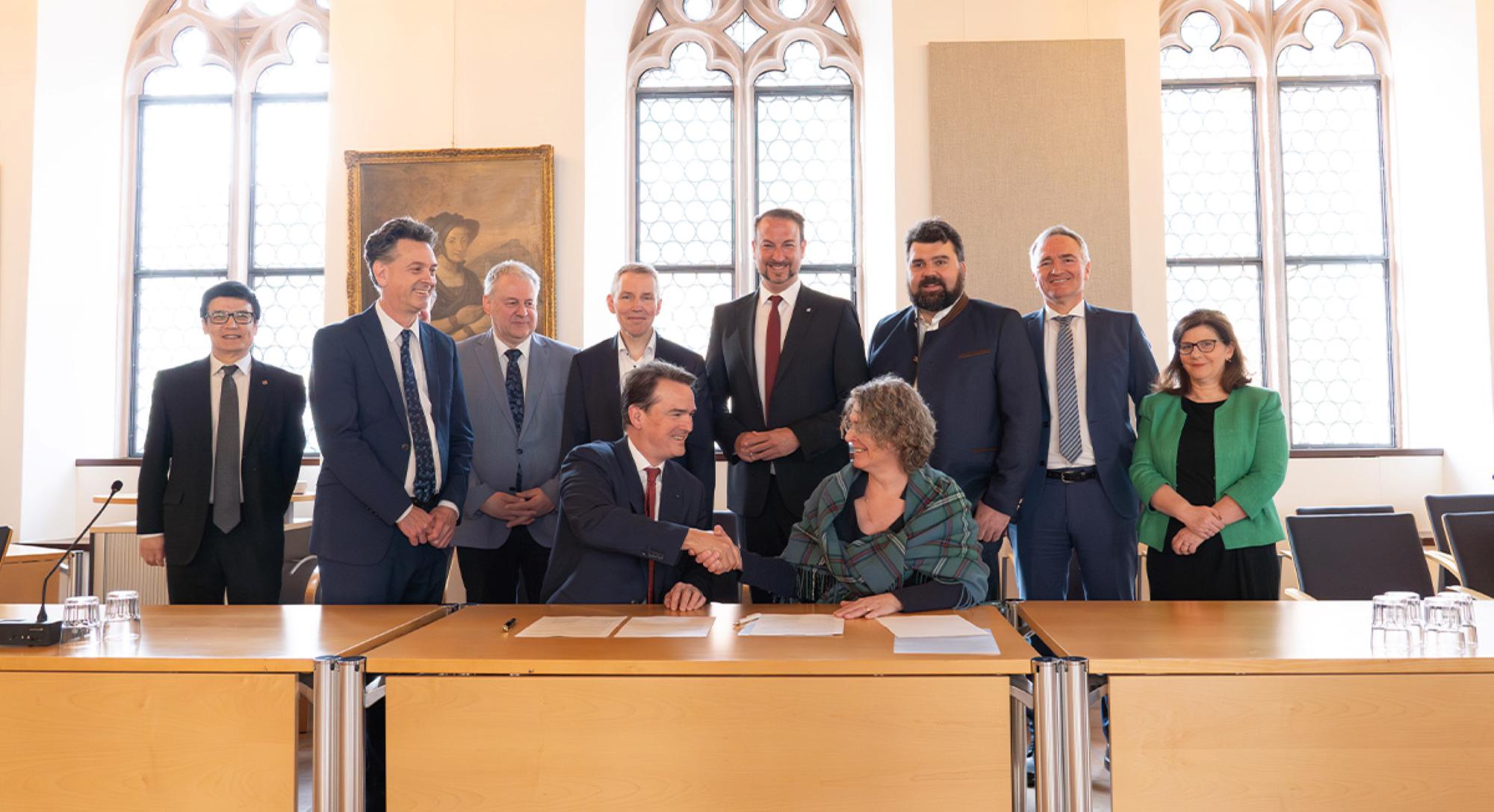
The University of Birmingham and Fraunhofer UMSICHT are renewing their partnership addressing the practical challenges of delivering green energy and renewable resources – looking to broaden their collaboration.
Professor Robin Mason, Pro-Vice-Chancellor (International) at the University of Birmingham, and Professor Matthias Franke, Director of Fraunhofer UMSICHT Institute Branch Sulzbach-Rosenberg, confirmed a four-year extension to the original 2017 partnership agreement.
Since 2020, there have been 28 co-authored papers between the University of Birmingham and Fraunhofer UMSICHT – largely in energy, environmental science, Chemical Engineering, Chemistry, Engineering, and Agricultural and Biological Sciences. With the To-Syn-Fuel and FlexJet projects on biofuels from residual and waste materials, two joint research projects in the HORIZON 2020 programme were successfully processed.
We are proud of the great work achieved by our partnership. As our global community consumes ever-increasing amounts of energy, collaborative research that helps to deliver green and sustainable energy becomes ever-more important
Professor Robin Mason, Pro-Vice-Chancellor (International) – University of Birmingham
The partnership’s scope has already grown from its original focus on energy and waste management, with future collaborative works involving carbon capture and utilisation, renewable energy, heat storage, hydrogen production and utilisation, critical elements and materials, and polymers recycling/chemical recycling.
Speaking after the special signing ceremony at Sulzbach-Rosenberg town hall, Germany, Professor Robin Mason commented: “We are proud of the great work achieved by our partnership. As our global community consumes ever-increasing amounts of energy, collaborative research that helps to deliver green and sustainable energy becomes ever-more important.
“We look forward to aligning the University of Birmingham’s flair for research innovation with Fraunhofer UMSICHT’s applied research expertise to extend our partnership across a range of areas of shared interest that will help to change people’s lives for the better.”
Renewable energies, but also the transformation to sustainable, emission-free raw materials, especially carbon – these are the challenges facing the industry today. Our application-orientated research in the fields of carbon conversion, recycling, biofuels and CCU / CCUS dovetail perfectly with the cutting-edge research in Birmingham to meet these demands.
Professor Matthias Franke, Director of Fraunhofer UMSICHT Institute Branch Sulzbach-Rosenberg
Professor Matthias Franke commented: “Renewable energies, but also the transformation to sustainable, emission-free raw materials, especially carbon – these are the challenges facing the industry today. Our application-orientated research in the fields of carbon conversion, recycling, biofuels and CCU / CCUS dovetail perfectly with the cutting-edge research in Birmingham to meet these demands.”
The practical outcome of the partnership can be seen, for example, at Tyseley Energy Park, where the University of Birmingham is active as a development partner. A research plant based on Fraunhofer UMSICHT technology is operated there. It converts biogenic residues into liquid energy carriers and chemicals.
Sulzbach-Rosenberg Mayor Stefan Frank commented: “The collaboration between Fraunhofer UMSICHT Sulzbach-Rosenberg and a global Top 100 university demonstrates that application-oriented research can be successful in rural areas. One reason for this is certainly that it is possible to demonstrate innovative technologies on a large-scale, which can sometimes be challenging to do in an urban environment.”
The University of Birmingham’s research links to Germany are strong and since 2018 has also had a partnership with Bundesanstalt für Materialforschung und -prüfung (BAM) – a senior scientific and technical federal institute with responsibility to the Federal Ministry for Economic Affairs and Energy in Germany. The University and BAM share wide-ranging research interests relating to Energy, Additive Manufacturing, Chemistry & Materials, Life & Environmental Sciences, and Engineering.
